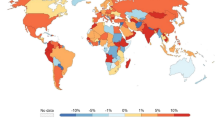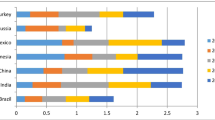Abstract
Trade in environmental goods and financial development may harness factors such as green investment, technological development, and renewable energy production, which are crucial in reducing energy security risks by diversifying energy sources. However, not many empirics have shed light on the impact of digitalization, environmental trade, and financial development on energy security risks in top energy-consuming countries. To fill this vacuum, this study intends to investigate the influence of digitalization, environmental trade, and financial development on energy security risk in top energy-consuming countries from 2003 to 2021. The study employs the 2SLS and GMM estimates for empirical estimation of top energy-consuming developed and developing economies. The results show that ICT negatively affects energy security risks in developed economies. The findings of the analysis also suggest that environmental trade and financial development cause energy security risks to be reduced in both developed and developing economies. Likewise, the energy security risks in both developed and developing nations are mitigated by ICT, GDP, carbon emissions, and renewable energy production. In contrast, the energy security risks are escalated by the rise in natural resource rents. In order to fully capitalize on the potential advantages of these elements and eventually ensure a more sustainable and secure energy future, governments, businesses, and financial institutions must work together.
Similar content being viewed by others
Data availability
The datasets used and/or analyzed during the current study are available from the corresponding author on reasonable request.
References
Akinyemi OE, Osabuohien ES, Alege PO, Ogundipe AA (2017) Energy security, trade and transition to green economy in Africa. Int J Energy Econ Policy 7(3):127–136
Aldieri L, Gatto A, Vinci CP (2021) Evaluation of energy resilience and adaptation policies: an energy efficiency analysis. Energy Policy 157:112505
APERC A (2007) Quest for energy security in the 21st century: resources and constraints. Asia Pacific Energy Research Centre, Tokyo, Japan
Arellano M, Bond S (1991) Some tests of specification for panel data: Monte Carlo evidence and an application to employment equations. Rev Econ Stud 58(2):277–297
Berdysheva S, Ikonnikova S (2021) The energy transition and shifts in fossil fuel use: the study of international energy trade and energy security dynamics. Energies 14(17):5396
Cergibozan R (2022) Renewable energy sources as a solution for energy security risk: empirical evidence from OECD countries. Renew Energy 183:617–626
Chen J, Rojniruttikul N, Kun LY, Ullah S (2022) Management of green economic infrastructure and environmental sustainability in one belt and road enitiative economies. Environ Sci Pollut Res 29(24):36326–36336
Cherp A, Jewell J (2011) The three perspectives on energy security: intellectual history, disciplinary roots and the potential for integration. Curr Opin Environ Sustain 3(4):202–212
Chu LK, Ghosh S, Doğan B, Nguyen NH, Shahbaz M (2023) Energy security as new determinant of renewable energy: the role of economic complexity in top energy users. Energy 263:125799
Cumby RE, Huizinga J, Obstfeld M (1983) Two-step two-stage least squares estimation in models with rational expectations. J Econom 21(3):333–355
Dabbous A, Barakat KA, Kraus S (2023) The impact of digitalization on entrepreneurial activity and sustainable competitiveness: a panel data analysis. Technol Soc 73:102224
Das S, Basu M (2020) Day-ahead optimal bidding strategy of microgrid with demand response program considering uncertainties and outages of renewable energy resources. Energy 190:116441
Deshuai M, Hui L, Ullah S (2022) Pro-environmental behavior–renewable energy transitions nexus: exploring the role of higher education and information and communications technology diffusion. Front Psychol 13:1010627
Doğan B, Shahbaz M, Bashir MF, Abbas S, Ghosh S (2023) Formulating energy security strategies for a sustainable environment: evidence from the newly industrialized economies. Renew Sustain Energy Rev 184:113551
Dou Y, Zhao J, Malik MN, Dong K (2021) Assessing the impact of trade openness on CO2 emissions: evidence from China-Japan-ROK FTA countries. J Environ Manag 296:113241
Durani F, Bhowmik R, Sharif A, Anwar A, Syed QR (2023) Role of economic uncertainty, financial development, natural resources, technology, and renewable energy in the environmental Phillips curve framework. J Clean Prod 420:138334
Ertugrul HM, Cetin M, Seker F, Dogan E (2016) The impact of trade openness on global carbon dioxide emissions: evidence from the top ten emitters among developing countries. Ecol Ind 67:543–555
García-Gusano D, Iribarren D, Garraín D (2017) Prospective analysis of energy security: a practical life-cycle approach focused on renewable power generation and oriented towards policy-makers. Appl Energy 190:891–901
Gujarati DN, Porter D (2009) Basic econometrics Mc Graw-Hill International Edition
Hassan A, Yang J, Usman A, Bilal A, Ullah S (2023) Green growth as a determinant of ecological footprint: do ICT diffusion, environmental innovation, and natural resources matter? PLoS One 18(9):e0287715
Huang W, Ortiz GGR, Kuo YL, Maneengam A, Nassani AA, Haffar M (2022) The non-linear impact of renewable energy and trade on consumption-based carbon emissions. Fuel 324:124423
Ibrahiem DM, Hanafy SA (2021) Do energy security and environmental quality contribute to renewable energy? The role of trade openness and energy use in North African countries. Renewable Energy 179:667–678
IEA (2016) Energy security. Online: URL http://www.iea.org/topics/energysecurity/. Accessed 7 Nov 2022
Jahanger A, Ozturk I, Onwe JC, Joseph TE, Hossain MR (2023) Do technology and renewable energy contribute to energy efficiency and carbon neutrality? Evidence from top ten manufacturing countries. Sustain Energy Technol Assess 56:103084
Kamyk J, Kot-Niewiadomska A, Galos K (2021) The criticality of crude oil for energy security: a case of Poland. Energy 220:119707
Kim J, Park K (2016) Financial development and deployment of renewable energy technologies. Energy Econ 59:238–250
Lahouel BB, Gaies B, Zaied YB, Jahmane A (2019) Accounting for endogeneity and the dynamics of corporate social–corporate financial performance relationship. J Clean Prod 230:352–364
Leal-Arcas R (2015) How governing international trade in energy can enhance EU energy security. Renew Energy Law Policy Rev 6(3):202–219
Lee CC, Wang CS (2022) Financial development, technological innovation and energy security: evidence from Chinese provincial experience. Energy Econ 112:106161
Lee CC, Yuan Z, Wang Q (2022) How does information and communication technology affect energy security? International Evidence. Energy Econ 109:105969
Li X (2005) Diversification and localization of energy systems for sustainable development and energy security. Energy Policy 33(17):2237–2243
Li W, Ullah S (2022) Research and development intensity and its influence on renewable energy consumption: evidence from selected Asian economies. Environ Sci Pollut Res 29(36):54448–54455
Li X, Ozturk I, Raza Syed Q, Hafeez M, Sohail S (2022) Does green environmental policy promote renewable energy consumption in BRICST? Fresh insights from panel quantile regression. Econ Res-Ekonomska Istraživanja 35(1):5807–5823
Liu D, Zhang Y, Hafeez M, Ullah S (2022) Financial inclusion and its influence on economic-environmental performance: demand and supply perspectives. Environ Sci Pollut Res 29(38):58212–58221
McCoskey S, Kao C (1998) A residual-based test of the null of cointegration in panel data. Economet Rev 17(1):57–84
Mo Y, Ullah S, Ozturk I (2023) Green investment and its influence on green growth in high polluted Asian economies: do financial markets and institutions matter? Econ Res-Ekonomska Istraživanja 36(2):2140302
Nepal R, Paija N (2019) Energy security, electricity, population and economic growth: the case of a developing South Asian resource-rich economy. Energy Policy 132:771–781
Ozturk I, Ullah S (2022) Does digital financial inclusion matter for economic growth and environmental sustainability in OBRI economies? An empirical analysis. Resour Conserv Recycl 185:106489
Pan X, Uddin MK, Saima U, Jiao Z, Han C (2019) How do industrialization and trade openness influence energy intensity? Evidence from a path model in case of Bangladesh. Energy Policy 133:110916
Peng HR, Qi SZ, Zhang YJ (2021) Does trade promote energy efficiency convergence in the Belt and Road Initiative countries? J Clean Prod 322:129063
Pesaran MH, Yamagata T (2008) Testing slope homogeneity in large panels. J Econom 142(1):50–93
Phillips PC, Moon HR (2000) Nonstationary panel data analysis: an overview of some recent developments. Economet Rev 19(3):263–286
Popescu MF (2015) The economics and finance of energy security. Procedia Econ Finance 27:467–473
Qu C, Shao J, Shi Z (2020) Does financial agglomeration promote the increase of energy efficiency in China? Energy Policy 146:111810
Raihan A (2023) Economy-energy-environment nexus: the role of information and communication technology towards green development in Malaysia. Innov Green Dev 2(4):100085
Saba CS, Ngepah N (2019) A cross-regional analysis of military expenditure, state fragility and economic growth in Africa. Qual Quant 53(6):2885–2915
Sadorsky P (2011) Trade and energy consumption in the Middle East. Energy Econ 33(5):739–749
Saqib N, Duran IA, Ozturk I (2023) Unraveling the interrelationship of digitalization, renewable energy, and ecological footprints within the EKC framework: empirical insights from the United States. Sustainability 15(13):10663
Shah WUH, Hao G, Yan H, Yasmeen R, Padda IUH, Ullah A (2022) The impact of trade, financial development and government integrity on energy efficiency: an analysis from G7-Countries. Energy 255:124507
Shittu W, Adedoyin FF, Shah MI, Musibau HO (2021) An investigation of the nexus between natural resources, environmental performance, energy security and environmental degradation: evidence from Asia. Resour Policy 73:102227
Sohail MT, Ullah S, Majeed MT (2022) Effect of policy uncertainty on green growth in high-polluting economies. J Clean Prod 380:135043
Sovacool BK, Walter G (2018) Major hydropower states, sustainable development, and energy security: insights from a preliminary cross-comparative assessment. Energy 142:1074–1082
Thanh TT, Ha LT, Dung HP, Huong TTL (2022) Impacts of digitalization on energy security: evidence from European countries. Environ Dev Sustain 1–46
Topcu M, Payne JE (2018) Further evidence on the trade-energy consumption nexus in OECD countries. Energy Policy 117:160–165
Tu CA, Chien F, Hussein MA, Ramli MM, Yanto S, Psi MS, Iqbal S, Bilal AR (2021) Estimating role of green financing on energy security, economic and environmental integration of BRI member countries. Singap Econ Rev 1–19
Usman A, Ozturk I, Hassan A, Zafar SM, Ullah S (2021a) The effect of ICT on energy consumption and economic growth in South Asian economies: an empirical analysis. Telemat Inform 58:101537
Usman A, Ozturk I, Ullah S, Hassan A (2021b) Does ICT have symmetric or asymmetric effects on CO2 emissions? Evidence from selected Asian economies. Technol Soc 67:101692
Valentine SV (2011) Emerging symbiosis: renewable energy and energy security. Renew Sustain Energy Rev 15(9):4572–4578
Xu L, Ullah S (2023) Evaluating the impacts of digitalization, financial efficiency, and education on renewable energy consumption: new evidence from China. Environ Sci Pollut Res 30(18):53538–53547
Yu Y, Tang K (2023) Does financial inclusion improve energy efficiency? Technol Forecast Soc Chang 186:122110
Zafar A, Ullah S, Majeed MT, Yasmeen R (2020) Environmental pollution in Asian economies: does the industrialisation matter? OPEC Energy Rev 44(3):227–248
Zaman KAU, Kalirajan K (2019) Strengthening of energy security & low-carbon growth in Asia: role of regional energy cooperation through trade. Energy Policy 133:110873
Zhang L, Bai W, Xiao H, Ren J (2021a) Measuring and improving regional energy security: a methodological framework based on both quantitative and qualitative analysis. Energy 227:120534
Zhang M, Zhang S, Lee CC, Zhou D (2021b) Effects of trade openness on renewable energy consumption in OECD countries: new insights from panel smooth transition regression modelling. Energy Econ 104:105649
Zhang H, Gao S, Zhou P (2023) Role of digitalization in energy storage technological innovation: evidence from China. Renew Sustain Energy Rev 171:113014
Author information
Authors and Affiliations
Contributions
Yumei Wang: idea, software, methodology, writing—original draft preparation, reviewing and editing. Sana Ullah: methodology, investigation, reviewing, and editing.
Corresponding author
Ethics declarations
Ethics approval
Not applicable
Consent to participate
I am free to contact any of the people involved in the research to seek further clarification and information.
Consent for publication
Not applicable
Competing interests
The authors declare no competing interests.
Additional information
Responsible Editor: Ilhan Ozturk
Publisher's Note
Springer Nature remains neutral with regard to jurisdictional claims in published maps and institutional affiliations.
Rights and permissions
Springer Nature or its licensor (e.g. a society or other partner) holds exclusive rights to this article under a publishing agreement with the author(s) or other rightsholder(s); author self-archiving of the accepted manuscript version of this article is solely governed by the terms of such publishing agreement and applicable law.
About this article
Cite this article
Wang, Y., Ullah, S. Effects of digitalization on energy security risk: do financial development and environmental trade matter?. Environ Sci Pollut Res 31, 249–261 (2024). https://doi.org/10.1007/s11356-023-31055-w
Received:
Accepted:
Published:
Issue Date:
DOI: https://doi.org/10.1007/s11356-023-31055-w




